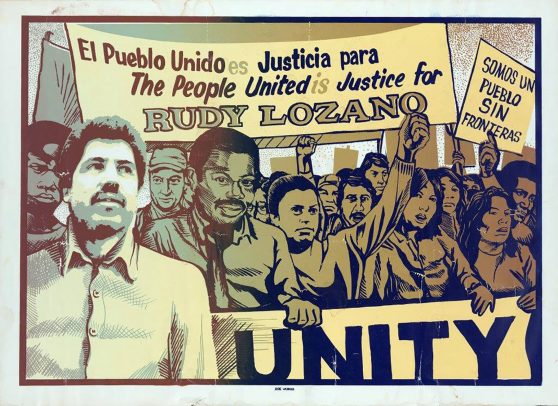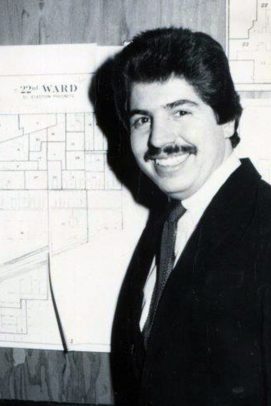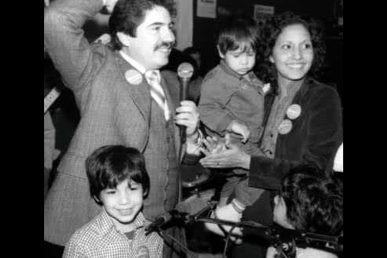Rodolfo ‘Rudy’ Lozano digital exhibit available online

In anticipation of July 29 marking Rodolfo “Rudy” Lozano Day in Cook County, the University of Illinois Chicago Library is announcing that a digital exhibit celebrating the Pilsen activist, labor organizer and UIC alumnus is available to the public.
The digital exhibit shows a portion of the physical exhibit currently on display at UIC’s Richard J. Daley Library, “A Search for Unity: Rudy Lozano and Coalition Building in Chicago,” which will run through the fall, said David Greenstein, lecturer in special collections and university archives.
The exhibit is made up of papers, photographs, posters and other memories about Lozano, who was murdered June 8, 1983, when he was 31. Greenstein curated the exhibit with Peggy Glowacki, former manuscripts librarian, and Elena Bulgarella, assistant archivist.
The digital exhibit has more than 50 documents, including photos, campaign posters, flyers and other artifacts from the Rudy Lozano papers and related collections, which are housed in the library archives. Also available online is a newly digitized video of a speech he gave at a 1979 May Day rally.

“Anybody can access the digitized documents, films and other materials that are part of that exhibit,” said Greenstein, adding that the text of the exhibit is available in Spanish as well as in English.
Lozano, who was born in Harlingen, Texas, to Mexican immigrant parents, was gunned down in 1983 months after losing a bid to become Chicago’s first Mexican American alderman. According to news accounts, Lozano failed to force an aldermanic runoff by only 17 votes but managed to get enough Latino voters to support Harold Washington’s successful bid to become Chicago’s first Black mayor.
Greenstein said the exhibit honors Lozano, who attended UIC in the 1970s and who was part of a student movement advocating for the university to recruit more Latino students and reshape the university’s curriculum to teach Latino studies. In addition, the movement was calling for a cultural center to serve the community on campus.
Lozano’s widow, Lupe, said she and her family are honored and thankful that the library chose to have the exhibit so that the UIC community and others can learn about who her husband was and how he dedicated his life to “his vision for unity among all working people.”
“It’s extremely important for UIC students and really everyone young and old to understand how committed and dedicated my husband was to improve the lives of Latinos, undocumented immigrants and all working people,” Lupe Lozano said. “Rudy was focused on creating political coalitions among minority and historically disenfranchised communities, especially among Black and Brown, and white progressive allies.”
She said that at UIC, Lozano’s work, along with the work of other underrepresented activists, helped open doors for better access and opportunities in higher education in the city’s historically underrepresented communities. His fight successfully led to the creation of the Latin American Recruitment and Educational Services initiative as well as the Latino Cultural Center, she said.

Latinx students now make up the second-largest group of students on campus, and UIC is a Hispanic-Serving Institution as designated by the U.S. Department of Education.
Her husband’s legacy serves an example that young people are “the future generations of our society,” and they should know about their shared history and “homegrown heroes that fought” for current rights.
“My husband was a pioneer in realizing that for working-class communities to have equal opportunities in our society, it was going to take running our own independent and progressive thinking candidates in electoral politics. Those that look and talk like us, that come from where we come from and could finally represent our voices at the table for our people and so many underserved communities seeking lasting change, racial justice and equal rights — big and small,” said Lupe Lozano.
She is also thankful that Cook County officials last year decided to celebrate her husband’s legacy in perpetuity by declaring July 29 Rudy Lozano Day. In addition to that honor, he has a Chicago Public Library branch and several schools named after him.
“When my husband passed, I dedicated my life to ensuring his legacy and life’s work would be recognized and shared far and wide. It has been our aim that Rudy’s vision for hope, change and justice would never be forgotten,” said Lupe Lozano. “His legacy is a part of Chicago’s legacy. It’s the legacy of a grassroots resistance movement in the Midwest, and it’s the legacy of my sons, their families and the grandchildren of my husband and me.”
Information about COVID-19 guidelines while visiting the library is available online. Contact UIC Library Special Collections and University Archives at 312-996-2742 for more information about the Rudy Lozano papers or to make an appointment to visit the library in person.
Categories
Topics
LARES, Latin American and Latino Studies, Richard J. Daley Library, Rudy Lozano, Special Collections
